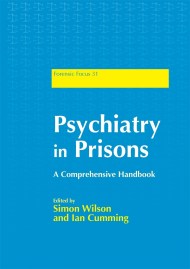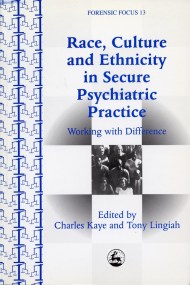This groundbreaking book explores the psychodynamics and socio-politics of the forensic therapeutic milieu, addressing some of the most difficult and complex issues facing practitioners. It sets out a psycho-social framework for understanding the predicament and the needs of those who live in and those who work in forensic mental health settings. It brings to life the thinking of those working on the frontline in an increasingly difficult and hostile environment, and draws together fresh and stimulating approaches to engagement with highly complex individuals who present challenges to traditional models of psychiatric assessment and treatment.
Contributors with considerable clinical experience and expertise from a range of disciplines consider the ethical, emotional and intellectual challenges of their work, and describe ways in which genuine containment and change can be achieved despite numerous perceived assaults on therapeutic relationships, and on the therapeutic milieu itself. Combining clinical case studies with organisational perspectives and clear descriptions of theoretical processes, they explore key issues including the challenges of maintaining role-appropriate, ‘boundaried’ relationships; the tensions between public protection and individual confidentiality; questions of risk and responsibility; duty of care and respect for individual liberty; the challenges posed by inter-professional tensions and rivalries; as well as specific clinical dilemmas. The difficulties they experience in fulfilling specific therapeutic roles in the face of uncertainties about the funding and commissioning of their services are addressed, and the final part of the book outlines some of the ways in which individuals, particular services and whole organisations may protect themselves when under attack.
This unique and highly original book is essential reading for all those working, or training to work, in both forensic and non-forensic inpatient therapeutic milieux and for academics and lay readers interested in the societal dynamics of inclusion and exclusion that are replicated and magnified in these settings.
Contributors with considerable clinical experience and expertise from a range of disciplines consider the ethical, emotional and intellectual challenges of their work, and describe ways in which genuine containment and change can be achieved despite numerous perceived assaults on therapeutic relationships, and on the therapeutic milieu itself. Combining clinical case studies with organisational perspectives and clear descriptions of theoretical processes, they explore key issues including the challenges of maintaining role-appropriate, ‘boundaried’ relationships; the tensions between public protection and individual confidentiality; questions of risk and responsibility; duty of care and respect for individual liberty; the challenges posed by inter-professional tensions and rivalries; as well as specific clinical dilemmas. The difficulties they experience in fulfilling specific therapeutic roles in the face of uncertainties about the funding and commissioning of their services are addressed, and the final part of the book outlines some of the ways in which individuals, particular services and whole organisations may protect themselves when under attack.
This unique and highly original book is essential reading for all those working, or training to work, in both forensic and non-forensic inpatient therapeutic milieux and for academics and lay readers interested in the societal dynamics of inclusion and exclusion that are replicated and magnified in these settings.
Newsletter Signup
By clicking ‘Sign Up,’ I acknowledge that I have read and agree to Hachette Book Group’s Privacy Policy and Terms of Use
Reviews
This book contains a brilliant and moving series of descriptions and analyses of the special difficulties encountered by mental health professionals who attempt to help our society solve one of the most complex, dangerous and destructive problems it faces...if we are to improve our ability to optimize, rather than cripple, the institutions and professionals to whom we have delegated the responsibility to treat mentally disturbed violent offenders, then the legislators, and the voters who elect the legislators, will need to be informed about what helps and what hinders them from performing that task. That is what this book describes and explains in elegant detail, and that is why I hope it will have as wide a readership as possible.























